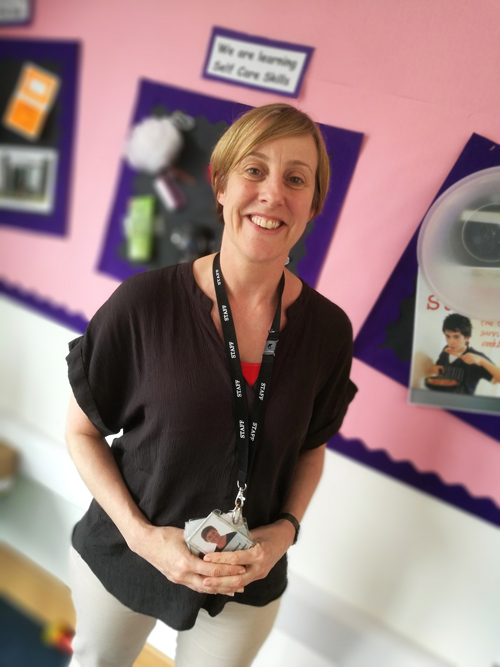Getting your first job is a rite of passage for most people, but for those with autism this milestone takes on an even greater meaning. We visited an Ofsted-rated outstanding special school and ASDAN registered centre to find out how one of its learners made the break through to paid employment.
When Tom started his post-16 ‘preparing for adulthood’ programme at New Siblands School, he was a quiet individual that needed a lot of supervision and instruction from staff.
Tom*, who has autism, is one of 15 students in the post-16 department at New Siblands, a special school with separate primary and secondary sites in Thornbury, South Gloucestershire. He and his peers are undertaking a three-year curriculum, which includes ASDAN’s Personal Progress, an Entry 1 qualification, our Towards Independence programme, as well as maths and English. The aim of the post-16 curriculum is to prepare students ‘socially, emotionally, academically and vocationally’ for the challenges they face as they make the transition from education to adulthood.
Work experience is a key part of the provision with many students undertaking placements in local companies as well as gaining new skills by working in the school’s café. Tom, aged 18 and currently in Year 13, has been undertaking two work experience placements: he spends a day a week at Slimbridge Wetland Centre and a half a day at a local sandwich shop.
Job offer
After impressing on his work placement at the sandwich shop, Tom was offered a paid job two evenings a week. Although other students have gone on to secure paid work after leaving New Siblands, Tom is the first learner to accomplish the feat while still a student at the school.
“It was amazing to have been offered the job at the sandwich shop,” Tom said. “I was told I was doing really well and that they wanted me to stay on in a paid role. I enjoy my tasks, which involve cleaning, preparing food and serving the customers. I also get on really well with the staff and enjoy working as part of a team. Getting the job has given me a lot of confidence.”
The sandwich shop manager said that when they realised they needed extra capacity in May, they immediately thought of Tom who they described as having a ‘keen and willing attitude’.
“We knew Tom would happily get on with the job and be on time,” they said. “He is a pleasure to be around. Tom no longer needs instruction and is able to see the work that needs to be completed, he is confident to ask for anything he needs and he always does a great job.”
Confidence boost

“Although Tom was very quiet before starting post-16, he has developed his confidence hugely,” said Carrie Osmond, the newly appointed headteacher at the school. “Like other students with autism, he can get anxious. Tom has learned how to communicate well with people he doesn’t know and has become good at trying new things.
“Now Tom goes to his work placements unprompted and is much more independent. When he told us about the job, he was beaming. It was a huge achievement and we are delighted for him.”
Personalised learning
Carrie says ASDAN’s courses, which the school has been delivering for the past five years, have played a key role in Tom’s success.
“Tom has benefitted hugely from Personal Progress and Towards Independence. What’s unique about these courses is the flexibility and personalised learning aspects: students can work at different levels to suit their ability and all the learning can be personalised. We don’t know what the ability of future groups will be so it’s important we have a curriculum that we can tailor according to the student’s ability.
“We use Personal Progress to accredit work placement activities: the preparation for work units such as following instructions and health and safety can be applied to any work context. Towards Independence accredits activities in the community, which help learners develop practical skills that they can use in their daily lives.”
One of the key skills Tom has developed having undertaken ASDAN courses is a greater sense of independence. He has learned how to do his shopping on his own, along with his laundry, cooking and budgeting. Tom, who plans to go to college, also knows how to ensure his own safety, what to do in an emergency, as well as staying healthy.
Outstanding provision
Tom’s story is just one of many examples of the school’s successes with young people with special educational needs and disabilities (SEND). In November, Ofsted rated the school outstanding for every aspect of its provision from early years to 16-19 study programmes.
Ofsted said: “There is no one-size-fits-all. The curriculum is highly personalised and organised to meet each individual’s needs. Each pupil has a carefully adapted timetable of activities and a variety of learning approaches are planned according to each pupil’s needs. As a result, pupils across the school make very strong progress from their starting points.”
Challenges ahead
Although the school is doing all it can to prepare learners for adulthood, obstacles remain in young people’s journeys to independence.
“The biggest challenge we face in terms of moving young people with SEND into paid employment is finding companies that are willing to take on our learners for work experience,” Carrie said. “Our students have more to offer that some employers may think and many companies are pleasantly surprised about how much our learners can offer. Our staff develop good relationships with employers and support them to ensure the placement is not only meaningful and enjoyable for the learner but that the company itself benefits.”
*Tom’s real name has been concealed for safeguarding reasons
